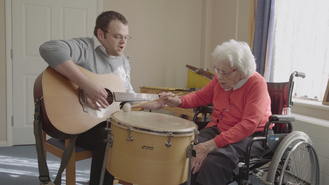Active music therapy and physical improvements from rehabilitation for neurological conditions
(Kogutek, Holmes, Grahn, Lutz, & Ready, 2016)
This article investigates the merits of music therapy for aiding patients recovering from physical impairments caused by neurological conditions
Link to full article.
Link to full article.
Introduction
Many individuals recovering from physical impairments caused by neurological conditions find it challenging to participate in traditional rehabilitation interventions such as physiotherapy, occupational therapy, and speech-language pathology. Pain, fear or lack of motivation can be barriers participation. Music therapy (MT) can be used as an additional tool to help overcome these barriers.
Why is MT helpful?MT helps facilitate physical improvement in individuals suffering with physical impairments caused by neurological conditions because playing an instrument engages most of the brain at once! Higher-order cognitive function can be improved by memorizing musical passages and improvising music. Reading and translating music into fine movements enhances sensorimotor function. Brain regions responsible for processing emotion are also involved by feeling reward by achieving something. MT also provides the additional benefit of distracting patients from their condition. Music can make rehabilitation feel like a fun and meaningful activity instead of a chore!
|
Research goal
The researchers wanted to collect evidence on different types of MT interventions and their influence on improving motor skill.
What did the researchers do? (Study Design)
The research team looked at primary studies that used active MT as a rehabilitative intervention to promote physical improvements in adults who were recovering from a variety of neurological conditions, such as Parkinson’s disease, stroke, cerebral palsy and brain injuries . The review did not include articles that focused primarily on using MT to achieve psychosocial, emotional, or spiritual therapeutic goals.
Results
The studies divided into 3 categories, which included both group and individual MT session formats:
Type of MT |
What is the goal? |
What could a session look like? |
How long are the sessions? |
Active MT improvisation (AMTI) |
|
|
2 hours weekly |
Therapeutic instrument music performance (TIMP) |
|
Functional target moving task where the participant is asked to hit a drum and touch their shoulder. |
30-40 minutes |
Music-supported therapy (MST) |
|
Participants played simple melodies that were based on repeated movements of a single finger on an electric piano or drums |
30 minutes |
Discussion
Recent literature suggests that MT is a beneficial supplemental treatment for individuals undergoing physical and neurological rehabilitative treatment. Results show that the music-supported therapy (MST) intervention demonstrated the most significant results in improving fine and gross motor skills. Many MT interventions were conducted by individuals were not trained as accredited music therapists.
Conclusions
The findings of the literature review suggest that active MT can improve motor skills and should be considered as a supplemental treatment in physical rehabilitation.
Future investigations
Many music therapists only use improvisational live music in neurological rehabilitation despite little academic research on the practice; more studies should be conducted to verify its effectiveness. Studies should have adequate number of participants, follow participants for at least 6 months and assess the cost-effectiveness of active MT compared with other interventions.
